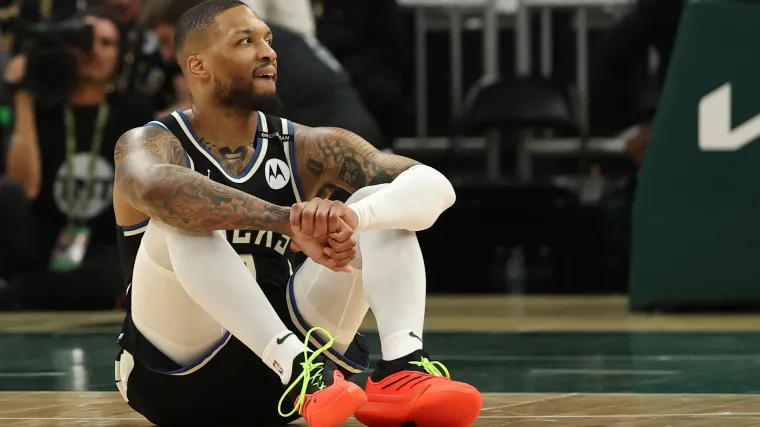It wasn’t the fairytale ending that the Milwaukee Bucks or Damian Lillard envisioned. The All-Star guard, expected to form a formidable duo with Giannis Antetokounmpo, was waived by the Bucks on Tuesday after a torn Achilles ended his season before it began. This decision leaves Milwaukee to spread the remaining $113 million of Lillard’s contract over the next five years. In a surprising twist, the Bucks have already moved to sign Myles Turner with the financial flexibility gained from Lillard’s departure.
However, new reports suggest that financial considerations were not the sole reason behind the decision. NBA insider Chris Haynes revealed on Tuesday night that Lillard’s desire to rehab in Portland, close to his family, played a significant role. According to Haynes, this decision did not sit well with some within the Bucks organization.
“Aaron Goodwin, Damian Lillard’s agent, about a month ago reached out to the Bucks and informed them that Dame would like to rehab back home in Portland and stay with his kids…and I was told that some people within the Bucks did not approve of that,” Haynes reported on NBA TV.
The Unexpected Turn in Lillard’s Journey
Lillard’s journey with the Bucks was anticipated to be a significant chapter in his illustrious career. Having been traded to Milwaukee with the hopes of capturing an NBA championship, his sudden release marks a dramatic turn of events. The injury, a torn Achilles, is one of the most severe setbacks an athlete can face, often requiring extensive rehabilitation and posing a risk to future performance.
The Bucks’ decision to waive Lillard, especially without prior notice, as Haynes noted, adds a layer of complexity to the narrative. It highlights the often harsh realities of professional sports, where business decisions can overshadow personal circumstances.
Implications for the Bucks and Lillard
The Bucks now face the challenge of restructuring their backcourt in the absence of Lillard. With Myles Turner joining the roster, the team must recalibrate its strategy to remain competitive in the Eastern Conference. The move also raises questions about the Bucks’ long-term planning and their ability to manage star players’ needs and expectations.
For Lillard, the path forward involves a focus on recovery and finding a new team willing to invest in his talent post-rehabilitation. His decision to prioritize family during his recovery is a reminder of the personal sacrifices athletes often make in pursuit of their careers.
Historical Context and Expert Opinions
Historically, the NBA has seen several instances where injuries have led to unexpected team changes. The case of Derrick Rose, who faced a series of injuries after winning the MVP award, serves as a poignant reminder of how quickly fortunes can change in professional sports.
Experts suggest that Lillard’s situation could set a precedent for how teams handle player injuries and personal requests. Sports analyst Mark Jackson commented, “Players are more than just assets; they’re human beings with families and personal lives. Teams need to find a balance between business interests and respecting players’ personal choices.”
Looking Ahead: What This Means for the NBA
This development could influence future negotiations between players and teams, particularly concerning injury management and personal requests. As the NBA evolves, the relationship between players and management continues to be a focal point, with both sides seeking to navigate the complex dynamics of professional sports.
As the Bucks move forward without Lillard, and as he embarks on his recovery journey, the NBA community will be watching closely. The outcome of this situation might well shape future policies and player-team interactions across the league.
In the meantime, fans and analysts alike will be keen to see how both the Bucks and Lillard adapt to their new realities. The story of Damian Lillard and the Milwaukee Bucks is far from over, and its next chapters promise to be as compelling as the last.
About The Author
 Indiana Fever Triumph in Commissioner’s Cup, Sophie Cunningham Shines
Indiana Fever Triumph in Commissioner’s Cup, Sophie Cunningham Shines Nathan Bishop Joins AFC Wimbledon: A New Chapter for the Former Man United Goalkeeper
Nathan Bishop Joins AFC Wimbledon: A New Chapter for the Former Man United Goalkeeper Roma Faces €4 Million Fine Amid UEFA Financial Fair Play Review
Roma Faces €4 Million Fine Amid UEFA Financial Fair Play Review Caitlin Clark and Aliyah Boston’s Ritual Captures Fans Before Indiana Fever Game
Caitlin Clark and Aliyah Boston’s Ritual Captures Fans Before Indiana Fever Game FC Barcelona Unveils 2025/26 Kit: A Blend of Tradition and Modernity
FC Barcelona Unveils 2025/26 Kit: A Blend of Tradition and Modernity